
The rainbow parrotfish is a species of fish in the family Scaridae.

Scarus is a genus of parrotfishes. With 52 currently recognised extant species, it is by far the largest genus in this family. The vast majority are found at reefs in the Indo-Pacific, but a small number of species are found in the warmer parts of the eastern Pacific and the western Atlantic, with a single species, Scarus hoefleri in the eastern Atlantic. Most are very colourful, and have strikingly different initial and terminal phases. Adults of most species reach maximum lengths of between 30 and 50 cm (12–20 in), but the rainbow parrotfish can grow to lengths of 1.2 m (3.9 ft).

The rusty parrotfish is a species of marine ray-finned fish, a parrotfish belonging to the family Scaridae. It is associated with reefs in the north western Indian Ocean and the Red Sea.

The queen parrotfish is a species of marine ray-finned fish, a parrotfish, in the family Scaridae. It is found on reefs in the tropical West Atlantic Ocean and the Caribbean Sea. Other common names include blownose, blue chub, blue parrotfish, blueman, joblin crow parrot, moontail, okra peji and slimy head. The young males and adult female queen parrotfish are a reddish-brown color, and quite different in appearance from the bluish-green color of the final phase male. This is a common species throughout its range and the International Union for Conservation of Nature has rated its conservation status as "least concern".

The dark-capped parrotfish, also known as the blue parrotfish, egghead parrotfish or yellow-barred parrotfish is a species of marine ray-finned fish in the family Scaridae. This species inhabits coral reefs in the Indo-Pacific from Mauritius in the east to the Tuamotus and the Line Islands in the west, north to the Ryukyu Islands, Japan and south to Shark Bay, Western Australia and the Great Barrier Reef.

The blue parrotfish is a member of the parrotfish genus Scarus. It is found on coral reefs in shallow water in the tropical and subtropical parts of the western Atlantic Ocean and the Caribbean Sea. They usually forage in a group of 500 individuals for spawning and deterring predators while feeding.

Chlorurus bleekeri, known commonly as Bleeker's parrotfish, is a species of marine fish in the family Scaridae.

Scarus frenatus is a species of parrotfish. Common names include bridled parrotfish, sixband or six-banded parrotfish or vermiculate parrotfish.
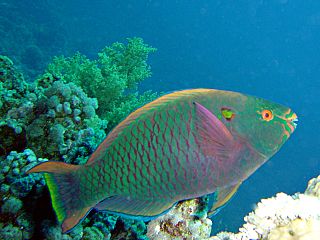
Scarus niger, common names the swarthy parrotfish, dusky parrotfish, and black parrotfish, is a species of parrotfish. It is in the phylum Chordata, class Actinopterygii, and family Scaridae. Like other members of its family, it has characteristic 10 dorsal soft rays, 9 dorsal spines, 9 anal soft rays, and 3 anal spines, It is found in Indo-West and Central Pacific, from the Red Sea, north to Japan, south to Australia and east to French Polynesia. It is found in lagoons, channels and outer reefs slopes on the depths of 2 to 20 metres. The dusky parrotfish often lives in solitude, but males may also live in a small group of mating females. The dusky parrotfish is primarily herbivorous, and its main source of food is benthic algae. At maturity, the fish is approximately 230-240mm long and weighs around 240g.
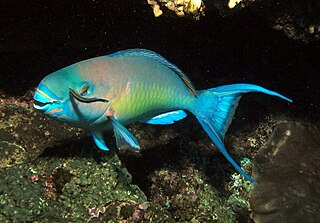
The ember parrotfish is a species of marine ray-finned fish, a parrotfish, in the family Scaridae. It is native to the Indian and Pacific Oceans. It is also known as the bicolor parrotfish and the redlip parrotfish.
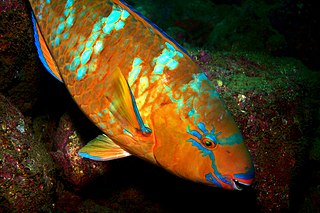
Scarus ghobban, also known as the blue-barred parrotfish, blue trim parrotfish, cream parrotfish, globe-headed parrotfish, green blotched parrotfish, yellow scale parrotfish, and bluechin parrotfish, is a species of marine ray-finned fish in the family Scaridae.

Scarus flavipectoralis, the yellow-fin parrotfish, also known as the king parrotfish, is a species of marine ray-finned fish, a parrotfish in the family Scaridae. It is found in the western Central Pacific from the Philippines east to the Solomon Islands, north to the Marshall Islands and south to Scott Reef and the Great Barrier Reef, it has also been recorded from Tonga.
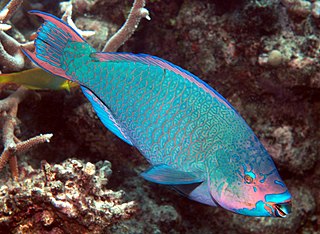
Scarus altipinnis, the filament-finned parrotfish, high-fin parrotfish or mini-fin parrotfish, is a species of marine ray-finned fish, a parrotfish from the family Scaridae. It occurs in the tropical and subtropical Western Pacific Ocean.

Scarus tricolor, also known as the tri-colour parrotfish or three-coloured parrotfish, is a species of marine ray-finned fish, a parrotfish, in the family Scaridae. It has a wide Indo-Pacific distribution.

Scarus scaber, the five-saddle parrotfish or dusky-capped parrotfish, is a species of marine ray-finned fish, a parrotfish, in the family Scaridae. It is native to Indian Ocean.
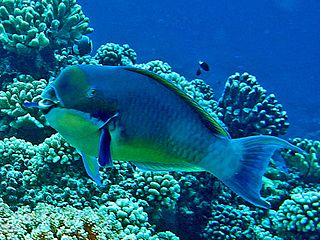
Chlorurus microrhinos, the blunt-head parrotfish or steephead parrotfish, is a species of marine ray-finned fish, a parrotfish from the family Scaridae. It is found in the Indo-Pacific region.
Scarus zufar, also known as Dhofar parrotfish, is a species of marine ray-finned fish, a parrotfish, in the family Scaridae. It is found along the central to southern coastal waters of Oman. S. zufar was first identified in 1995.
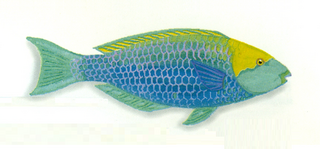
Scarus prasiognathos, the Singapore parrotfish, is a species of marine ray-finned fish, a parrotfish, in the family Scaridae. It is native to the eastern Indian and western Pacific Oceans, where it lives in coral reefs.

Scarus globiceps, commonly known as the globehead, violet-lined, speckled or roundhead parrotfish, is a marine fish native to the Indian and Pacific Oceans, where it lives in coral reefs.

Scarus psittacus, the common parrotfish, is a species of marine ray-finned fish, a parrotfish, in the family Scaridae. Other common names for this species include the palenose parrotfish, Batavian parrotfish and the rosy-cheek parrotfish. It has a wide distribution in the Indo-Pacific region where it is associated with coral reefs. This species is utilised as food. It is the type species of the genus Scarus.




















